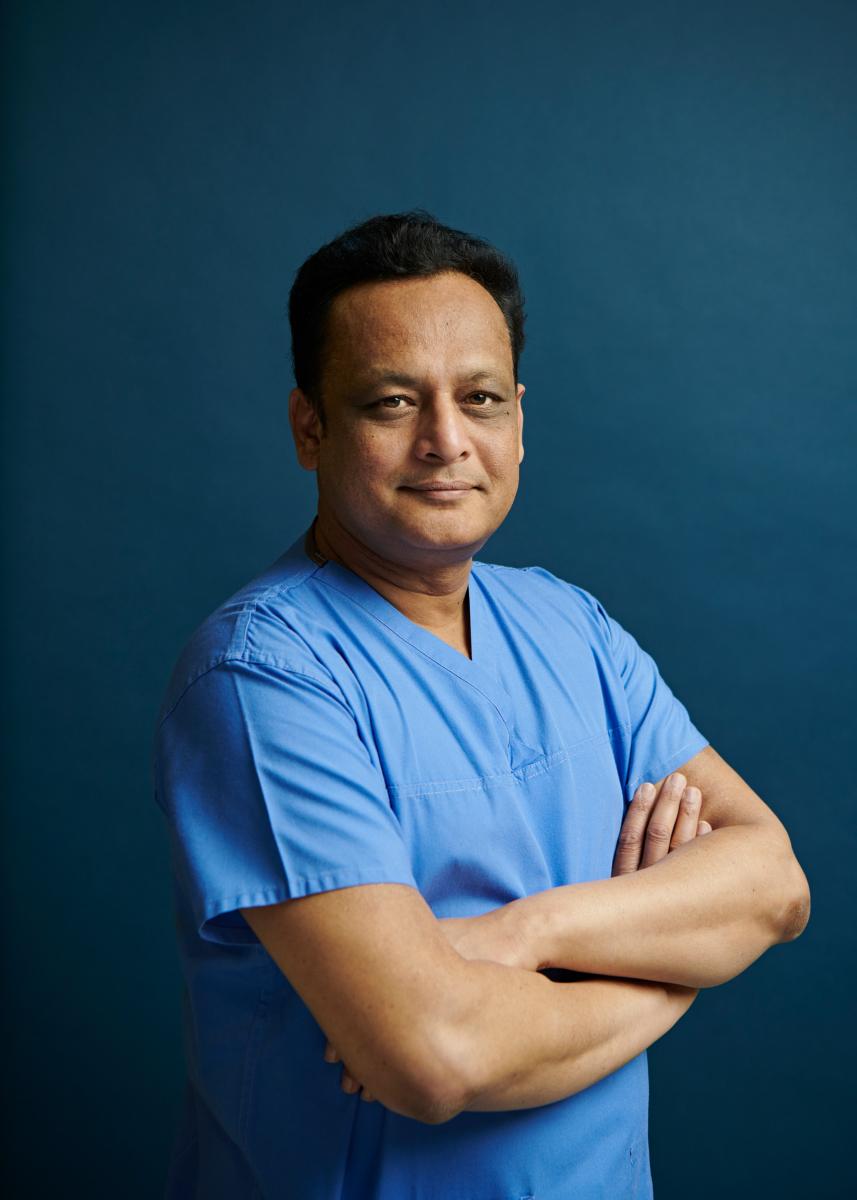60 seconds with Rajesh Sivaprakasam

Rajesh Sivaprakasam and his team will be completing an astonishing and life tranforming kidney transplant from father to son on Channel 5 as part of our #OperationLive series running from 9 - 11 April. Find out more about him below.
What is your role at Barts Health NHS Trust, and what is your specialty?
I am a renal transplant and access surgeon at Barts Health NHS Trust. I’m also the lead for robotic renal failure surgery, education and research. I work with an excellent team of motivated healthcare professionals, with a single aim of transforming and saving lives of patients with end-stage renal failure.
I assess live kidney donors with a committed team and also perform live donation procedures. All of our patients are offered compassionate care from the moment they attend their first visit and throughout their journey to donate a kidney to their loved one.
I’m actively involved in the education of future doctors, and offer work experience opportunities to students from East London Schools aspiring to become healthcare professionals. I also lead research in my department, and pursue various research projects to innovate and improve care offered to our renal patients.
What is your role in Operation Live?
I will be leading the renal transplantation surgery with incredible colleagues, and will demonstrate the various stages of this life saving procedure. I firmly believe that demystifying this surgical procedure will help to improve awareness for renal transplantation and help all to appreciate the advantages of organ donation.
Why is kidney donation important for everyone to know about?
Every year around 1,400 people generously donate their organs across the UK when they die, and more than 1,000 people donate a kidney or part of their liver while they are alive. Presently, there are around 6,000 people on the transplant waiting list in UK. Sadly three people die every day waiting for an organ due to a lack of donors.
What do you feel are the main issues surrounding kidney donation? Are there particular issues within our community here in East London?
Most people do support organ donation; yet, only around a third of people have registered a decision to donate, and less than half share this decision with a loved one.
When faced with the unfortunate situation of losing their loved one, the family members are more likely to agree to donation going ahead if their relative had recorded their decision to donate on the NHS Organ Donor Register, or had previously discussed their decision with them.
- In 2017/18, of those providing their ethnicity when registering on the NHS Organ Donor Register, 3.3% were Asian, 1% was black and 2% were mixed race and 114 of the 1,574 deceased organ donors were from minority ethnic groups.
- A third of people (35%) waiting for a kidney across the UK are from Black, Asian or Ethnic Minority communities. There is a longer waiting time for kidney transplants for Black and Asian patients vs White patients (The average wait is approximately 2.5 years vs. 2 years for a white patient).
- In 2017-18, 28% of UK kidney transplants were in Black, Asian or Ethnic Minority communities.
What messages do you want key stakeholders of our community to know, such as local council members and community group representatives?
We need to improve our efforts in engaging with various ethnic groups to offer them more information on the importance of organ donation and transplantation. Our renal transplant team, along with our patient association, is willing to support any local initiative. We along with previous patients (who either donated a kidney or had a transplant), are able to deliver patient educational events to help raise awareness in local communities.
What are some myths about kidney organ donation that you’d like to dispel?
We always assess a live donor with their long-term health in mind. All of our willing live kidney donors are given a comprehensive assessment to confirm their suitability to donate an organ. We provide them with plenty of needed information, time and support before the transplant takes place and post operation. A member of the Human Tissue Authority will discuss all risks involved with the procedure, and will thoroughly run through these risks directly with the donor.
Is kidney donation safe for the donor? Can they do everything normally after the operation?
It’s safe for the patient selected by our team after a full assessment has taken place. Despite the urgency for their loved one’s need for renal transplant; we never compromise on our process in approving the willing donors for donation.
Removal of a kidney is performed using a key-hole technique, which allows the donor to experience less discomfort. On average, they stay in the hospital 2-3 days and recover to near normal health within 6-8 weeks. They will be able to return to normal activities in a staged manner from the time of discharge, and they are seen at our clinic on regular intervals and also monitored for any long-term health impact.
What are you hoping audiences watching Operation Live will get out of the programme?
This programme is timely in supporting our efforts to improve public awareness, and help to promote the benefits of organ donation and live kidney donation.
It highlights the life of a patient with end-stage renal disease and also, a father’s efforts in saving and transforming his son’s life. I believe that all of our donors are heroes!
I hope the public observes the excellent care offered to patients by our team, which is replicated across all areas in Barts Health NHS Trust. It will enable them to see the importance of teamwork and the joy that we experience when working in healthcare.
On a personal note, I admire the enthusiasm of our patients for sharing their surgical experience, and as a member of an amazing team, I’m thankful for this opportunity to transform their life.
